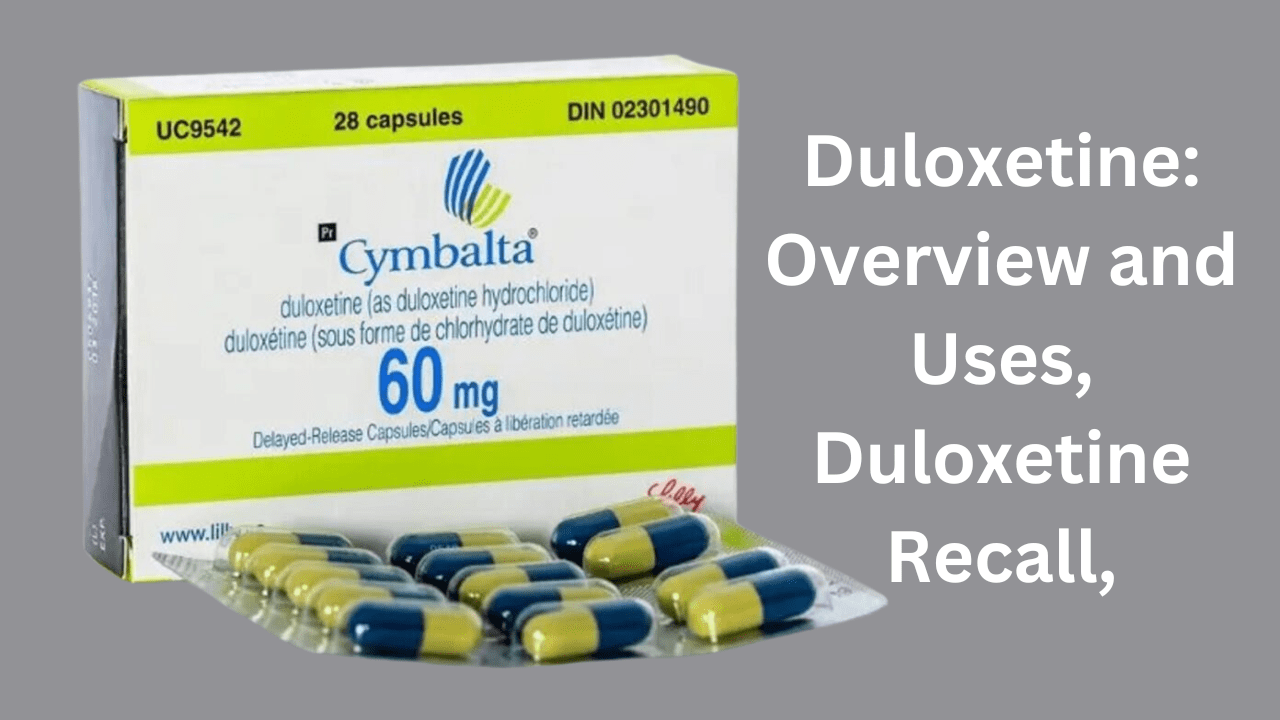Duloxetine: Overview and Uses
Duloxetine is a widely used prescription medication that belongs to the serotonin-norepinephrine reuptake inhibitor (SNRI) class. It is primarily used for the treatment of several conditions, including:
- Major depressive disorder (MDD)
- Generalized anxiety disorder (GAD)
- Chronic musculoskeletal pain
- Neuropathic pain associated with diabetes (diabetic peripheral neuropathy)
- Fibromyalgia
Duloxetine works by increasing the levels of serotonin and norepinephrine, two neurotransmitters that are thought to influence mood, anxiety, and pain perception. The drug is sold under various brand names, with Cymbalta being the most popular. The typical dosage ranges from 30 mg to 120 mg per day, depending on the condition being treated, and the duration of treatment can vary based on the individual’s response to the medication.
Indications for Use
Duloxetine is commonly prescribed to treat:
- Depression: It helps improve mood, energy, and overall feelings of well-being.
- Anxiety: Used to alleviate excessive anxiety, restlessness, and physical symptoms of anxiety.
- Chronic Pain: Especially in conditions like fibromyalgia and chronic lower back pain, duloxetine helps to reduce pain sensations.
- Diabetic Neuropathy: It relieves nerve pain, which is common in diabetes.
Side Effects of Duloxetine
While effective for many patients, duloxetine can have a range of side effects, which include:
- Common Side Effects: Nausea, dry mouth, dizziness, fatigue, insomnia, constipation, and excessive sweating.
- Serious Side Effects: Elevated blood pressure, liver damage, severe skin reactions, serotonin syndrome, suicidal thoughts in younger patients, and an increased risk of bleeding.
Duloxetine Recall: What Happened?
In some instances, duloxetine has been subject to recalls due to quality control issues. Recalls are typically initiated due to:
- Manufacturing defects: Contamination during production or issues with the drug’s strength or consistency.
- Labeling errors: Incorrect dosage or administration instructions.
- Packaging defects: Packaging that could lead to a lack of product integrity, such as exposure to moisture.
Companies Involved in Duloxetine Recall
Several pharmaceutical companies manufacture duloxetine, including Eli Lilly (which originally developed Cymbalta), along with many generic versions produced by companies like Teva Pharmaceuticals and Dr. Reddy’s Laboratories. In recent recall instances, some of these companies have been involved due to quality control failures. The FDA has been instrumental in monitoring and issuing recall notices when necessary.
Financial Impact of the Recall
Drug recalls can have a significant financial impact on pharmaceutical companies. In cases where duloxetine has been recalled, companies can face considerable losses due to:
- Direct costs: The expense of recalling the product from the market, shipping, and destroying defective batches.
- Litigation costs: Patients who suffer adverse effects from recalled drugs may file lawsuits, adding to the financial burden.
- Reputational damage: Loss of trust among consumers and healthcare providers can lead to a decline in sales.
The extent of financial losses can vary, but for a high-demand drug like duloxetine, the costs can run into millions of dollars.
Role of Government in Drug Recall
Drug recalls are regulated by agencies like the U.S. Food and Drug Administration (FDA). When quality issues are detected, the FDA collaborates with the manufacturer to assess the situation and initiate a recall if necessary. The process may involve several steps:
- Investigation: When an issue is reported, the FDA investigates whether the drug poses a health risk.
- Voluntary Recall: Most recalls are voluntary, with the company deciding to pull the product from the market.
- FDA Monitoring: In some cases, the FDA may request or mandate a recall if a significant public health risk is identified.
In addition to managing recalls, government agencies like the FDA provide public notices, ensuring patients, healthcare providers, and pharmacies are informed about the recall.
Legal Issues and Liability
Pharmaceutical companies can face significant legal challenges if a drug recall results in harm to patients. Product liability lawsuits can be filed by patients who experience adverse effects from a recalled drug, especially if it is found that the company failed to maintain proper manufacturing standards or withheld information about risks.
In severe cases, companies may also face class action lawsuits, where multiple plaintiffs come together to sue the manufacturer. Settlements or court rulings can lead to substantial financial penalties and mandatory compensation for affected individuals.
Patient and Family Reactions
Drug recalls, especially for widely prescribed medications like duloxetine, can cause anxiety among patients and their families. Common reactions include:
- Concern for safety: Patients often worry whether they have been exposed to a defective or dangerous batch of medication.
- Anger and frustration: Many patients feel betrayed if they believe their health has been compromised due to poor quality control by the pharmaceutical company.
- Confusion about treatment: A drug recall may leave patients uncertain about continuing their current treatment, leading to additional doctor visits and changes in medication regimens.
Healthcare providers typically guide patients through the process, offering alternative treatments or medications to replace the recalled drug. Open communication between patients and doctors is crucial to managing concerns and maintaining treatment continuity.
Conclusion
The recall of duloxetine highlights the complexities of ensuring drug safety and the consequences for pharmaceutical companies when something goes wrong. While duloxetine remains a valuable medication for treating conditions like depression, anxiety, and chronic pain, quality control issues can lead to recalls that affect both patients and the companies involved.
Patients should stay informed about drug recalls and maintain regular communication with their healthcare providers to ensure their treatment is safe and effective. Meanwhile, pharmaceutical companies must adhere to stringent safety protocols to prevent such issues and protect patient health.

